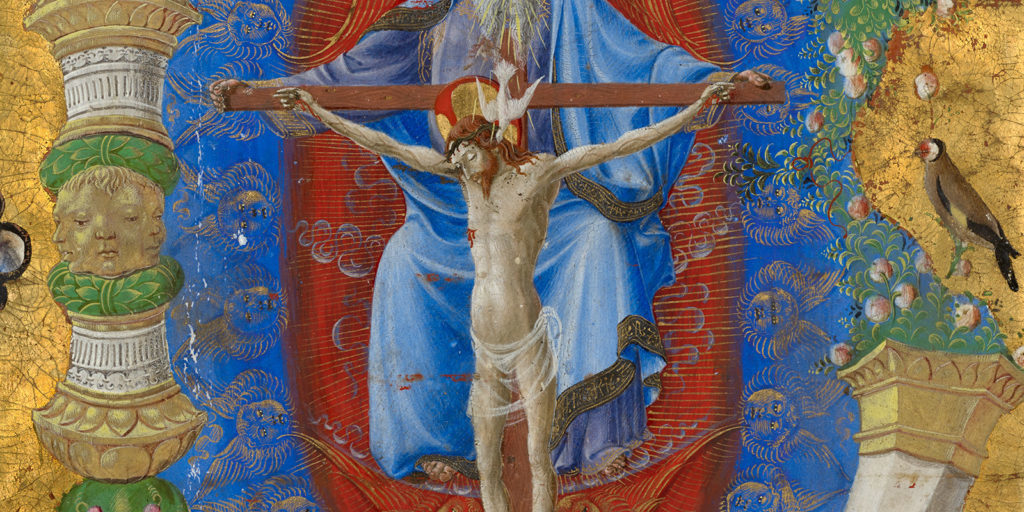
The Blessed and Only God: Part Two
When we approach Paul’s exalted doxologies of God, one feature of them immediately strikes us. Let’s read again 1 Tim. 1:17 and 6:15-16.
To the King of ages, immortal, invisible, the only God, be honor and glory forever and ever. Amen.
The Blessed God who reigns Above
He who is the blessed and only Sovereign, the King of kings and Lord of lords, who alone has immortality, who dwells in unapproachable light, whom no one has ever seen or can see. To him be honor and eternal dominion. Amen.
The feature that stands out here is God’s utter transcendence, that he stands above all things, beyond all things. He cannot be grasped by the human mind, probed by the human eye, controlled by the human will. He is not bound by time and change. Most of Paul’s terms express this transcendence negatively. He is immortal, invisible, unapproachable, he stands alone as the only God and only Sovereign. These are all negative terms and concepts. They tell us who God is by way of who is not. To say he is “immortal” is the same thing as saying, “he is not mortal.” To say he is “invisible” is the same thing as saying, “he is not visible.” Such language is necessary when we are talking about God because by definition we do not have the ability or capacity to understand who God is in himself. He is transcendent, he stands above and beyond all we can think, feel, or imagine. As an analogy, we can’t really conceive of what “infinity” is. “Infinity” simply means, “not finite.” Can you conceive of an infinite number? Can you in one moment grasp a series of numbers that never end? You could count all your life, and never reach the last one. There would always be countless numbers you missed. You could even count from the beginning of time right up to the end of time and still be left with countless numbers ahead of you. Before such an impossibility, all we can say is, “there is no end in sight.” So it is with God. All we can do is stand back, abashed and dumbstruck at the plentitude of God.
Yet, such language, if you can excuse the pun, has its limits. They don’t tell us anything positive about God. They don’t tell us who God is, only who He is not. But there is at least one term Paul uses here that gets as close as possible to a positive description of God’s inner life. He is the “blessed” God. By “blessed” Paul means to say that God is supremely content and at peace. When you combine the idea of “blessed,” meaning “at peace, happy, and content,” with all these other negative terms about God who stands above it all, this is the picture we get—a God who is eternally, omnipotently happy. Nothing can disturb his calm or peace. No sadness or sin can overwhelm his experience of joy.
The negative terms for God, unbalanced with this one positive term, leaves us with an impression of God as a black hole of information we can’t do anything about or feel anything about—an infinite number set. But when combined with the fact that God is “blessed,” those negative terms take shape. No longer do our minds and hearts stand cold and unblinking before a bottomless blackness; they stand dazzled and overwhelmed by the heat and light cascading from a power and personality that can’t be measured or stopped. After all, only persons, not powers can be content, happy, and blessed.
Paul describes Him as the King of the Ages, the blessed and only sovereign. There is no challenge to his rule, his control, his reach. There are no swords hanging over his head, no need to shout to make his point. He’s never backed into a corner. There’s no worry about scheming courtiers or successful generals stealing his glory. His royal court, is a court of One. Unlike so many other kings and despots who rule by the consent and by the taxes of the governed; in his realm the flow of power is reversed, all things “live and move and have their being” in him. We live by his consent, we thrive on his bounty. His power and control are infinite; and a being in total control with all power at his disposal is supremely happy, supremely blessed.
He is immortal. Apart from his blessedness, this word comes off as simply describing an endless duration of days extending into future. But God is not just immortal in the sense of never experiencing an end to his life. His blessedness means that his immortality is defined by the abundance of life. He is a God of boundless energy, where everything is cranked up to dial eleven. His life results in a cataract of life, an abundance and exuberance in excess and overkill. As Psalm 104 puts it, “O LORD, how manifold are your works! In wisdom have you made them all; the earth is full of your creatures. Here is the sea, great and wide, which teems with creatures innumerable, living things both small and great.” This is a statement describing not a stingy miser trying to conserve energy and outflow. Rather, God delights in teeming and innumerable things. He lives off nothing, but gives life to everything. As Paul says in 6:13, “God gives life to all things.” A being overflowing with energy and vitality and immortal life must be supremely happy and blessed. He is not a God whose lack needs to be filled; but a God whose surplus is freely given. Click To Tweet
He is invisible. This term taps into the OT insistence that God cannot be seen or rendered by any artistic representation. There are various ways we could talk about this feature of the biblical God. There’s a moral or ethical side to this. God’s holiness and our sinfulness are mutually exclusive, like opposite poles on a magnet. Our negative state must be neutralized and atoned for before we can “look” at and approach each other. But there is also an objective side to this, a side that holds up regardless of our spiritual state. Paul is speaking here in a NT context, a context in which Christ has made a way into the presence of God. Paul is certainly talking to people, such as Timothy and the church at Ephesus, for whom such access has been secured through the gospel.
And yet despite that, Paul continues to say that “no one has ever seen God or can see God.” Through Christ we have access and communion with God, but that does not mean that we now have the ability to know God exhaustively. We can never stand back far enough to take in the whole of who God is. We can never, as sometimes happens in a long marriage, know everything about God, have heard all his stories, or predict all his responses. In this sense, the command against making an image of God is a prohibition against reducing him to any one picture, any one representation that deceives us into thinking we have a handle on him, that places him in our pocket, or places him at our disposal.
Again, it’s easy to turn this attribute of “invisibility” into a purely negative term that ends up picturing God to us as some impersonal force of nature like gravity or electromagnetism. We can’t “see” those things either because they are impersonal abstractions. That’s not the case here. Paul balances this negative term with a profoundly positive one, “he dwells in unapproachable light.” He is not invisible because there isn’t anything there to see, but because there is too much to see. There’s too much to take in. As the old hymn puts it, “O help us to see: ’Tis only the splendor of light hideth Thee.” He is a God whose surplus never ends. Click To Tweet
What this leaves us with is a picture of God who is infinitely deep, infinitely beyond our wildest imaginations; and not for all the time of eternity will we ever come to an end of the knowledge of God. For us, there will be no end in sight, but only and always fresh surprises, fresh experiences, fresh encounters with the living God. All that God is in himself will eternally elude us, but because of all that God is for us the invitation will always be open to go “further up, and further in.” A being who is always the life of the party, never running out of things to say and do, must be supremely happy and blessed.
What view of God’s transcendence does Paul leaves us with here? I’d like you to take at least two things away from our time on the summit of these visions of God. First, He is not a God whose lack needs to be filled; but a God whose surplus is freely given. Second, He is a God whose surplus never ends. His infinitude defines his blessedness; a God infinitely content with never-ending stores of life, power, and wisdom as Ps. 16 affirms, “in your presence there is fullness of joy; at your right hand are pleasures forevermore.”
*This is part two of a four part series on the Doctrine of God in 1 Timothy. See part one here.

